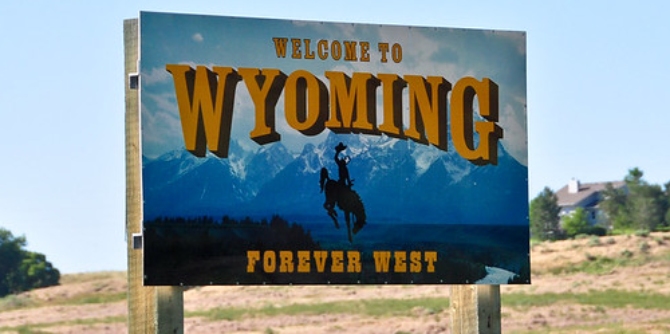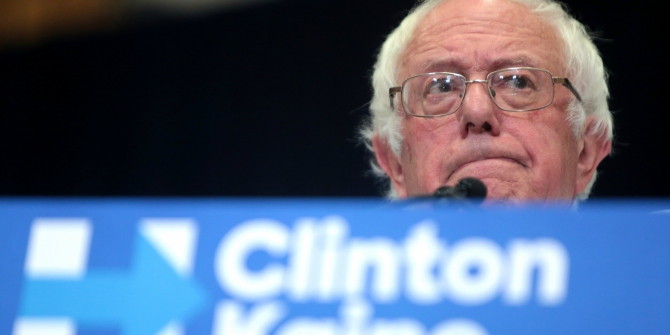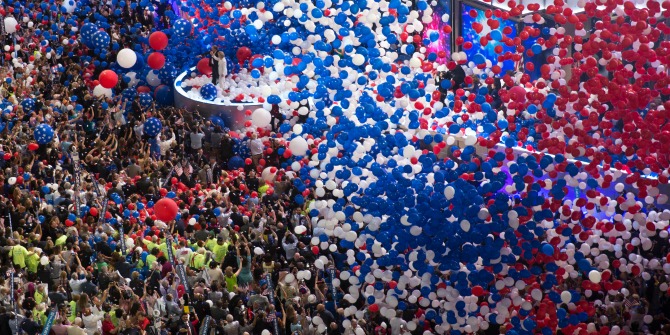 During the 2016 presidential primary season, both candidates Donald Trump and Bernie Sanders expressed concern that their party’s nomination process hurt their chances of receiving their party’s presidential nod. But to what extent do party nomination rules help or hinder candidates? In new research which examines how representative state delegations to the 2016 nominating conventions were, James King finds that the Democrats’ use of superdelegates made these delegations less representative, hurting Bernie Sanders’ chances of gaining the nomination. The Republicans’ use of winner-take all primaries, on the other hand, benefited Donald Trump’s aspirations for his party’s nomination.
During the 2016 presidential primary season, both candidates Donald Trump and Bernie Sanders expressed concern that their party’s nomination process hurt their chances of receiving their party’s presidential nod. But to what extent do party nomination rules help or hinder candidates? In new research which examines how representative state delegations to the 2016 nominating conventions were, James King finds that the Democrats’ use of superdelegates made these delegations less representative, hurting Bernie Sanders’ chances of gaining the nomination. The Republicans’ use of winner-take all primaries, on the other hand, benefited Donald Trump’s aspirations for his party’s nomination.
The contentious 2016 presidential election between Republican Donald Trump and Democrat Hillary Clinton was preceded by equally or even more contentious campaigns for the two parties’ nominations. Seventeen candidates vied for the Republican nomination but the contest quickly boiled down to Trump, Senator Ted Cruz (TX), Senator Marco Rubio (FL), and Governor John Kasich (OH). Clinton fended off a spirited challenge from Senator Bernie Sanders.
The two parties’ nomination campaigns featured complaints that the parties’ rules for choosing delegates to the national conventions did not create state delegations that reflected candidates’ support among voters and thus were unjust. The contenders complaining most vociferously were Trump and Sanders. Both argued that their candidacies were hampered by party rules that made it difficult for them to succeed. Trump wrote in a Wall Street Journal op-ed essay that “[d]elegates are supposed to reflect the decisions of voters but the system is being rigged by party operatives with ‘double-agent’ delegates who reject the decision of voters.” Sanders’ complaints focused specifically on the Democratic Party’s use of superdelegates, unbound party leaders and elected officials who serve as convention delegates, and the overwhelming support for Clinton among the superdelegates. Arguing for the allocation of delegates to be proportional to votes received in states’ primary elections and party caucuses, Sanders expressed hope that superdelegates would “respect the wishes of the people of [their] states and vote in line with how the people of that state voted.” Both Trump and Sanders also showed concern regarding laws in some states that restricted participation in a presidential primary or caucuses to registered voters affiliated with the party.
To what extent are the rules governing delegate selection in presidential nominations biased and, in particular, to what extent did the rules used in 2016 hinder the Trump and Sanders candidacies? In new research which analyses the representativeness of state delegations to the 2016 national conventions, I find that the Democrats’ rules hurt Sanders’ candidacy but the Republicans’ helped Trump to win his party’s presidential nomination.
Debates over party rules for presidential nominations are not new. Party rules have been characterized as the “invisible participants” of nomination campaigns that affected candidates’ prospects of securing their parties’ nomination and, by consequence, affected the fortunes of political parties, the outcomes of elections, and ultimately decisions regarding public policy. In 1972, the Democratic Party began reforms of the rules governing its presidential nominations to expand public participation in the process, first by increasing the proportion of convention delegates linked to the results of primary elections and party caucuses. Subsequently the party instituted a requirement of proportional representation among candidates, banning winner-takes-all primaries in which the candidate with a plurality of votes won all of a state’s convention delegates. In 1984 Democrats introduced “superdelegates,” party leaders and elected officials who would act as free agents. The goal was to restore the influence of political professionals who might moderate the extremism of the party’s rank and file and, if no candidate secured enough delegates to win the nomination, provide the necessary delegate votes to a candidate perceived more electable or potentially a more effective president. Republicans followed the Democrats’ lead in choosing more national convention delegates through primary elections and party caucuses. However, the GOP continues allowing winner-takes-all state primaries.
Other rules potentially influencing the process of selecting national convention delegates are determined by state law. The first is whether a state uses a primary election or party caucuses as the first step for selecting national convention delegates. Research shows that caucuses typically have lower rates of voter participation, with caucus participants being more ideological and less representative of a state’s electorate. As a result caucus states provide greater opportunities for candidates whose policy preferences are more extreme. The other key “rule” stemming from state law is whether a party’s delegate-selection event in a given state is open to all registered voters, open to voters affiliated with the party and voters not affiliated with either party, or closed to everyone except voters affiliated with the party. Criticism of closed primaries and caucuses typically comes from candidates whose bids might be term insurgent in that they challenge the traditional party hierarchy—candidates such as Donald Trump and Bernie Sanders.
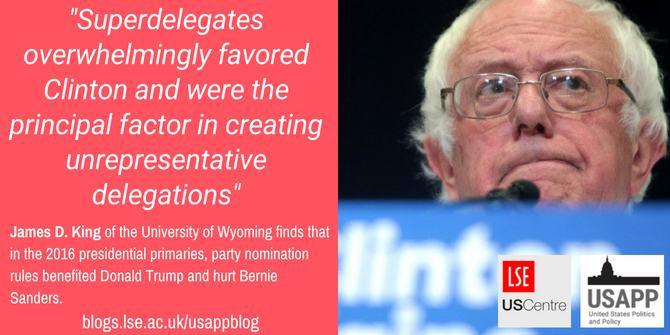
“Bernie Sanders” by Gage Skidmore is licensed under CC BY SA 2.0
To assess the impact of party rules on presidential nominations, I calculated a measure of representativeness that gauges how closely the percentage of delegates committed to each candidate within a state’s national convention delegation matches the vote percentage of the primary or caucus was calculated. A score of 1 indicates a perfect relationship between candidates’ vote shares and delegate shares in the state. Figure 1 shows the distribution of representativeness scores for Democrats and Republicans in 2016. Although parties’ maximum scores are identical, the Democrats’ mean representativeness score is higher and the range of scores is lower. On the whole, state delegations to the Democratic national convention were more representative of the primary election and caucus results than were delegations to the Republican national convention.
Figure 1 – Representativeness of State Convention Delegations, 2016
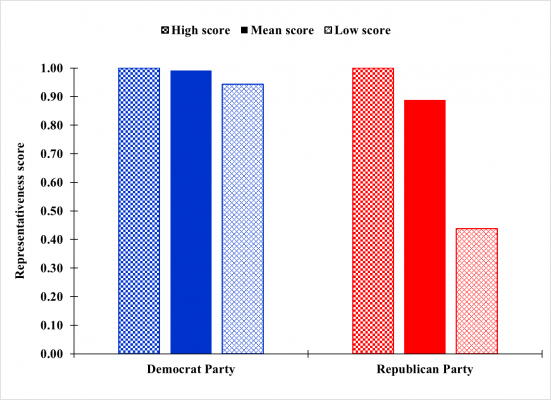
A regression analysis testing the effects of various rules governing the selection of delegates to each party’s 2016 national convention reveals that representativeness of state delegations was affected principally by one “rule.” For Democrats, it was the use of superdelegates; the higher the percentage of a state’s delegation comprised of superdelegates, the less representative the delegation was of popular preferences. Sanders’ complaint regarding superdelegates has merit: superdelegates overwhelmingly favored Clinton and were the principal factor in creating unrepresentative delegations. For Republicans, it was the use of winner-takes-all primaries. Other factors held constant, use of a winner-takes-all primary reduced the representativeness of a state’s RNC delegation by about 30 percent. Neither the choice between a primary election and caucuses to initiate the delegate-selection process nor the degree of inclusion—limiting participation to voters affiliated with the party or opening the process to all voters—affected representativeness of state delegations. These conclusions regarding the 2016 nominating contests confirm the results of earlier studies: the party rules that created unrepresentative state delegations to national conventions in the 1980s continue to do so in the 21st century.
A second potential impact of party rules for nominating contests concerns the vote shares received by candidates. Whether a state restricted participation to those who identify with the party, or opened the process to independent or unaffiliated voters had no significant effect on candidates’ vote shares. Instead, the key rule is whether a state opts for a presidential primary or initiates the delegate-selection process with caucuses. As seen in Figure 2, Republicans Trump and Kasich won significantly larger vote percentages in primary states while Democrat Sanders and Republicans Cruz and Rubio did significantly better in caucus states. (Although Clinton did slightly better in primary states than caucus states, the effect was not statistically significant.) These results match findings of earlier studies with the more ideological candidates—Sanders, Cruz, and Rubio—faring better in caucus states.
Figure 2 – Effect of Holding a Presidential Primary on Candidates’ Vote Shares, 2016
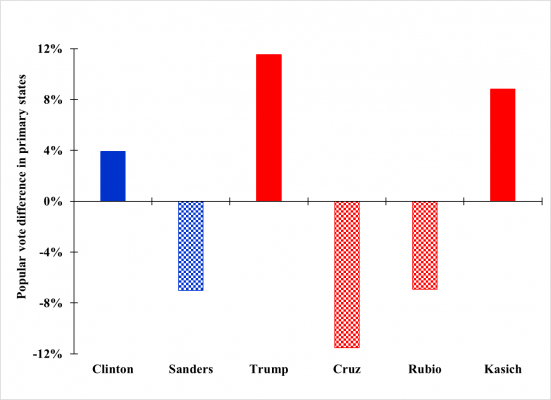
The grand irony for the 2016 presidential nomination campaigns was that Donald Trump benefited the most under the Republicans’ rules despite his complaints about the process being “rigged” against him. First, roughly three-fourths of states held primary elections rather than caucuses and Trump’s vote percentages were eleven points higher in primary states than caucus states. Second, Trump benefited from the use of winner-takes-all primaries as he received all delegates from eight of the eleven states holding such events before the effective conclusion of the Republican nomination contest on May 3, 2016. Had Republicans followed the Democrats’ practice of proportional allocation of pledged delegates, Trump would have earned roughly 200 fewer pledged delegates to the Republican national convention. At a minimum he would not have secured the party’s presidential nomination as early as he did and might not have earned the majority of delegates necessary to win the nomination.
Bernie Sanders’ complaint about the Democratic Party’s use of superdelegates has more validity, as the vast majority of these unpledged party leaders favored Hillary Clinton and tilted states’ delegations in her favor. Yet is it doubtful that this prevented Sanders from winning the Democratic presidential nomination, as Clinton received a majority of pledged delegates selected through primaries and caucuses. The discontent expressed by Sanders’ supporters, however, has led to a commitment to link some superdelegates’ convention votes to the popular votes in the future.
The details of Democrats’ decision to reduce the role of superdelegates are not yet known and it is unknown how the Republicans might alter their delegate-selection process for the 2024 campaign (or the 2020 campaign should Trump not seek reelection). What is undisputable, and likely inevitable, is that the rules will benefit some candidates, impair other candidates, and once again be the source of controversy.
- This article is based on the paper “Party Rules and Equitable Representation in U.S. Presidential Nominating Contests”in American Politics Research 46 (September 2018): 811-833 (first published online 21 February 2018).
Please read our comments policy before commenting.
Note: This article gives the views of the author, and not the position of USAPP – American Politics and Policy, nor the London School of Economics.
Shortened URL for this post: http://bit.ly/2w8zafm
About the author
 James D. King – University of Wyoming
James D. King – University of Wyoming
James D. King is professor of political science in the School of Politics, Public Affairs, and International Studies at the University of Wyoming. His research touches upon various aspect of the American presidency, including presidential elections, presidents’ choices in staffing their administrations, and presidential-congressional interactions.


